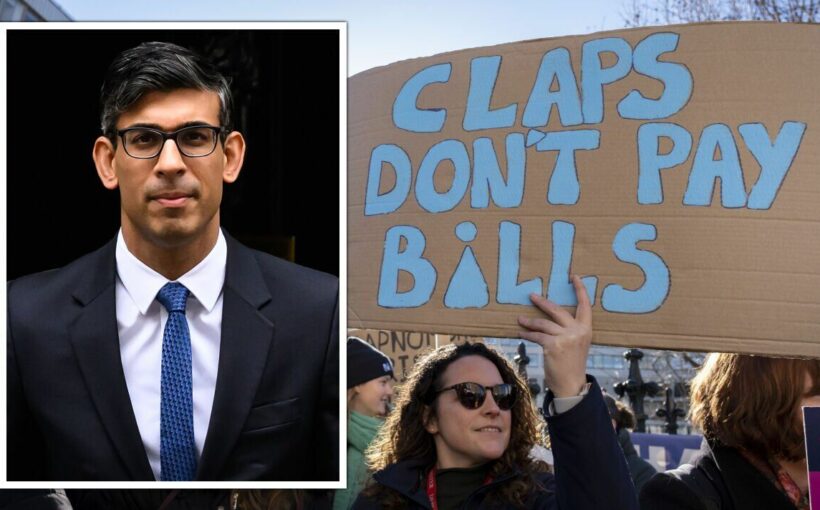UK industrial action: What strikes are coming up?
We use your sign-up to provide content in ways you’ve consented to and to improve our understanding of you. This may include adverts from us and 3rd parties based on our understanding. You can unsubscribe at any time. More info
Several union bosses ratcheted up action while the Treasury attempted to limit pay rises.
The exchequer reportedly told ministers that public sector pay increases must stay below five per cent next year to control inflation.
Pat Cullen, general secretary of the Royal College of Nursing (RCN), called it “disgraceful” that the Treasury told Ministers that they must cap public sector pay and “punish key workers yet again”.
She said: “If the Government wants a summer of discontent over this, then they are going the right way about it. This is not what we want, the public wants, or patients deserve – but we will always do what it takes to protect our patients and the NHS.”
Nursing staff working in emergency departments, intensive care units and cancer wards will strike for the first time during a continuous 48-hour walkout from 6am on March 1, the Royal College of Nursing (RCN) said.
The RCN will reduce services to an “absolute minimum” and ask hospitals to rely on members of other unions and other clinical professions instead.

Ms Cullen said: “These strikes will leave no area of the NHS unaffected. This is the consequence of a Prime Minister and Chancellor who will not listen and are pushing more nurses out into the cold.
“We have been overwhelmed by the support of the British public and it is time for Rishi Sunak and Jeremy Hunt to hear what the British people are telling them – they want a resolution and so do we.
“These strikes do not need to go ahead if the government just comes to the negotiating table.”
The nursing union announced that the initial strike benefit rate – the amount the union pays striking staff to make up for lost pay – will be increased from £50 to £80 per day, with the rate increasing to £120 from the fourth day of action.
Previous action took place only during the day shift, for 12 hours each time. The RCN demanded a 19 per cent pay rise for this year, although Ms Cullen has repeatedly said she is happy to meet at the negotiating table.
The government has refused to re-open pay negotiations for 2022-23, saying it was right to stick to the recommendation of the independent pay review body of around four per cent when public finances are struggling.
A Treasury source said: “High inflation is an insidious hidden tax that eats into savings and pay cheques – we need to halve it this year. Inflation-busting public sector pay awards will make that job harder, prolonging the misery for everyone.”
NHS bosses fear that Rishi Sunak’s goal of eliminating waits of more than a year and a half by the end of next month could be missed if strikes continue.
Junior doctors on Monday are set to join walkouts by announcing three days of strikes.
Health Secretary Steve Barclay wanted to offer staff a pay deal for 2023-24 backdated to the start of January, with the Treasury understood to have accepted the principle of a one-off payment for this financial year.
But Mr Barclay has been unable to find a figure to offer staff that unions and the Treasury will accept.
Chancellor Jeremy Hunt said pay rises of more than around two per cent in 2023-24 must be funded by cuts in departmental budgets.
NHS bosses fear that Rishi Sunak’s goal of eliminating waits of more than a year and a half by the end of next month could be missed if strikes continue.
Separately, Royal Mail workers voted overwhelmingly to continue with a campaign of industrial action in a bitter dispute over pay, jobs and conditions which could last for the next six months.
A fresh ballot of members of the Communication Workers Union showed almost 96 per cent were in favour of more strikes unless the deadlock is broken.
Royal Mail workers have staged a series of strikes in recent months, including in the busy run up to Christmas.
No new strikes have been announced but the union’s postal executive will meet next week to discuss the next move.
Rail workers have confirmed they will stage a series of “sustained and targeted” strikes.
Members of the Rail, Martine and Transport union (RMT) will walk out on March 16, 18 and 20, and April 1, at 14 train operators.
The union’s members at Network Rail will strike on March 16 and will then launch a ban on overtime.
RMT general secretary Mick Lynch said: “Rail employers are not being given a fresh mandate by the Government to offer our members a new deal on pay, conditions and job security.
“Therefore, our members will now take sustained and targeted industrial action over the next few months.”
The RMT accused employers of refusing to put any new offers on the table.
The union, which represents 40,000 workers across Network Rail and 14 train operators, rejected offers from employers last week.
Transport Secretary, Mark Harper said: “Just days after denying its members a say on their own future, the RMT leadership is now trying to make them lose multiple days’ wages through yet more strikes. Passengers want this dispute to end.
“Our railways are not currently financially sustainable and these best and final offers would have given workers what they want and, crucially, the passengers what they need.
“All more strikes will do is damage the rail industry even further and drive more passengers away.”
Source: Read Full Article
